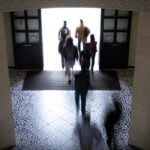By The Mesquite editorial board
The student code of conduct in the student handbook for Texas A&M-San Antonio states “the behavioral norms expected of a university student are those of common decency and decorum …”
This university’s community of students, faculty and administrators may want to consider whether the same behavioral expectations should apply to students’ comments on a social networking site like Facebook.
The recent public discourse on the university and Mesquite-News’ Facebook pages concerning the four crosses on the bell tower located on University Way raises some questions as to how student leaders will take this civic responsibility.
Will they squander the opportunity to have an intelligent argument about whether a tower with official university seals should have an icon — considered religious by some, and decorative by others — is a violation of the separation of church and state?
Or, will they stifle valuable conversation for the entire student body by resorting to sarcasm, personal attacks and self-absorption by not realizing their responsibilities as student leaders, whether they are acting in an official capacity or not.
Such tactics limit valuable valuable opportunities to demonstrate the precise reasons why students are attending a public university; to develop lifelong learning skills and develop leadership abilities in San Antonio and beyond.
A civil public discourse helps students grow to become responsible global citizens, a goal outlined in our institution’s strategic mission. The university-sponsored Facebook page (as well as other affiliated pages) have the ability to either build understanding and community, or when used poorly, divide and diminish the university’s image across the city, community and region.
Currently, there are no standards specifically referring to students’ behavior on sites like Facebook. However, there are some general guidelines for students’ nonacademic behavior which include the statement mentioned earlier which appears in the purpose section on page 36 and includes the following: “recognition of and non-infringement upon the rights and property of others….”
Under examples of infractions on Page 37, verbal abuse/threat appears under No. 201. Other examples of nonacademic misconduct include “verbal abuse, threats, intimidation, harassment, coercion and/or other conduct which threaten or endangers the health or safety of another person. Finally, Page 41 lists “abusive, indecent, profane or vulgar language in a public place or written communication, including emails…and/or disrespect of the rights and privileges of others; verbal, written and/or physical harassment of any university student or employee. Jokes and other comments interpreted as threats are taken seriously and acted upon to the full extent of the university’s procedures.”
While not addressing social networks specifically, these guidelines do address certain expectations for student behavior and can be applied to written Facebook posts.
The Mesquite seeks and encourages students’ diverse viewpoints on issues affecting students, the university, the local community, and city, state and federal government.
Some of the comments on the Mesquite and this university’s Facebook pages were thoughtful and respectful of the campus diversity. Other comments were thoughtless, sarcastic and disrespectful.
Personal attacks, name-calling, snide and sarcastic remarks lower one’s credibility. Whatever valid ideas, thoughts or arguments presented are lost in the ugly banter.
One comment addressed the fear that nonreligious or students practicing other faiths may experience from students who support the presence of the crosses on the university tower. Those favoring the placement of the crosses experience the same backlash from peers who are not religiously affiliated or of other faiths. That is why some of them did not want to be identified in the story that appeared in the Mesquite.
Students from either side of this argument should never be afraid to voice their opinion at an institution of higher learning. People who have opposing viewpoints should not fear speaking up, but the tone of the discourse on Facebook about the cross, may indicate why more students are not willing to step up and speak their mind regardless of which side they are on. Students on both sides of the argument fear personal attacks, ridicule, sarcasm, disrespect, name-calling and reprisal.





